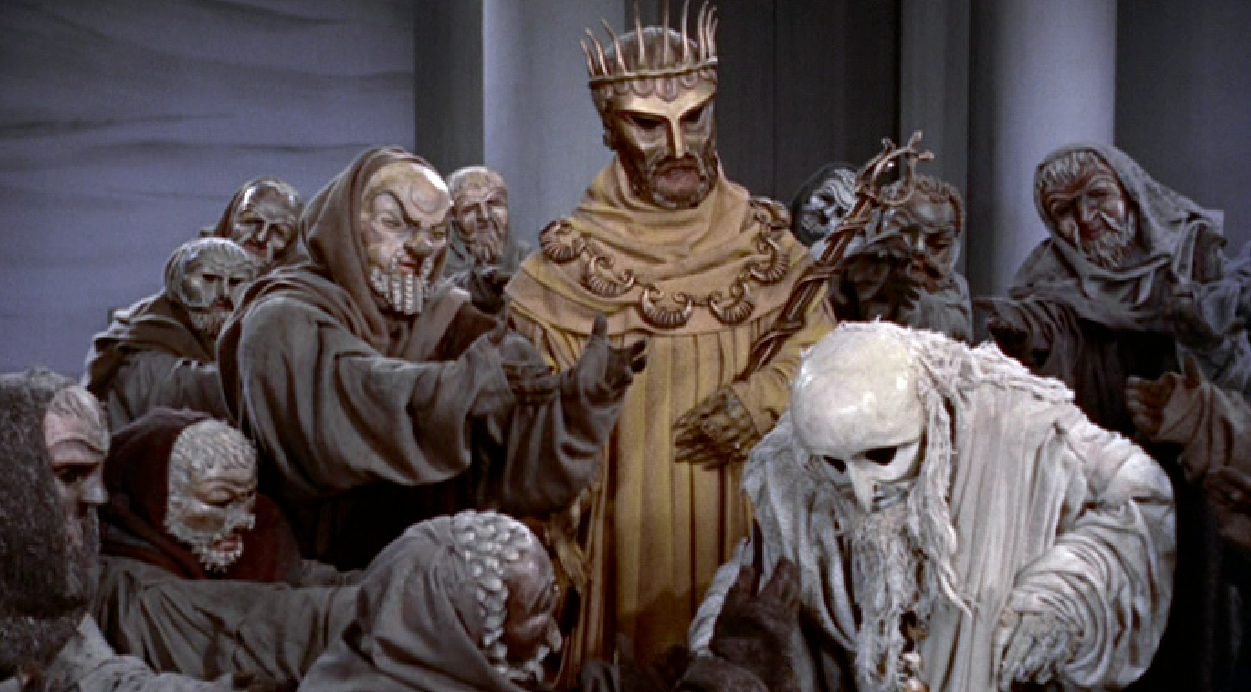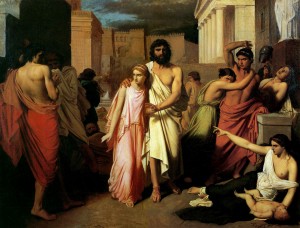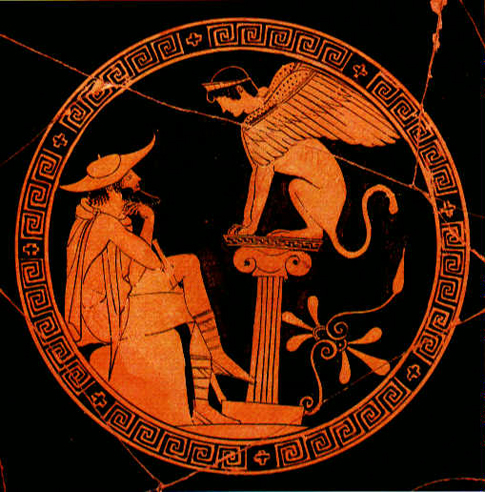In preparation for our final discussion and writing on Oedipus Rex, please review the following:
Review the Oedipus the King analysis post on the website.
Complete your MWDS for Oedipus Rex. Be sure to include plenty of apt text references to aid your discussion! Think carefully as you complete the MOWAW and question boxes on the second page; these will be very helpful to have handy during the discussion.
Consider the Aristotelian definition of a tragedy and a tragic hero and consider how they apply to the play and the character. Aristotle believed that plot was the primary element in tragedy, and the plot must follow these four principles: 1) The plot must be a whole, with a beginning, middle, and end; 2) The plot must be internally whole, with incidents relating to each other and not interrupted by a deus ex machina or completed by a coincidence; 3) The plot must reflect a serious treatment in terms of its complexity and universal appeal; and 4) The plot should not only include a change of fortune for the central character, but also some reversal or surprise and a recognition within that character of his/her changed status that brings about knowledge.
Consider how the character of Oedipus fits Aristotle’s definition of a tragic hero: 1) neither completely good or bad; 2) of high stature; 3) suffers a change in fortune due to a tragic mistake (hamartia) of some kind–most often through hubris; and 4) has a “moment of truth” or insight into his tragic flaw and what it has taught him. The following questions will lead you to deeper thinking about the play and AP’s main focus, the MOWAW, or Meaning of the Work as a Whole. You do not need to prepare answers for them, but do think about how they apply to the play, the development of Oedipus as a character, and the MOWAW. You may wish to incorporate some of these ideas into your Major Works Data Sheet:
1. Is Oedipus a helpless victim of fate, or were there ever times when he could have acted to prevent his downfall? Was Oedipus made to do what the oracle had prophesied, or is he responsible for his own destiny?
2. Discuss the meaning of power and powerlessness as it applies to Oedipus. Consider the following questions: What is his blindness symbolic of? Is he powerless by his blindness, or is his newfound blindness a powerful means for him to finally understand his own fate? Which Oedipus is more powerful: the one who didn’t know his fate (at the beginning of the play), or the one who now knows (by the end of the play)?
3. In what sense may Oedipus be regarded as a better, though less fortunate, man at the end of the play? What has he gained from his experience?
4. In many works of literature a character has a misconception of himself or his world. Destroying or perpetuating this illusion contributes to a central theme of the work. Which characters in Oedipus Rex could be examined through this lens? Discuss what the character’s illusion is and how it differs from reality, and then explain how the destruction or perpetuation of the illusion contributes to the meaning of the work.
Our discussion will not be text-specific in that you will not be expected to support your ideas with exact quotations from the Roche translation. However, you will be expected to mention appropriate occurrences within the play that can back up your conclusions. Free downloads of Oedipus Rex are widely available, as are links to the text. Check this post for a list of possibilities.
Finally–and this is really important!–be prepared to speak. Your active participation is required for you to receive top marks on the seminar discussion.
♦ ♦ ♦ ♦ ♦
BONUS: Tom Lehrer, a professor of mathematics at Harvard University, is best-known for a catalogue of songs written in the 1950s and 60s, which discussed art, politics, and current events in humorous and satirical ways. This song is a rather irreverent (and funny) take on the most tragic of Greek dramas. Enjoy!




 Another motif—blindness versus sight—is emphasized in poetic images and in various overt comparisons. A contrast is repeatedly drawn between the physical power of sight and the inner sight of understanding. For example, Tiresias, though blind, can see the truth which escapes Oedipus, while Oedipus, who has penetrated the riddle of the Sphinx, cannot solve the puzzle of his own life. When it is revealed to him, he blinds himself in an act of retribution.
Another motif—blindness versus sight—is emphasized in poetic images and in various overt comparisons. A contrast is repeatedly drawn between the physical power of sight and the inner sight of understanding. For example, Tiresias, though blind, can see the truth which escapes Oedipus, while Oedipus, who has penetrated the riddle of the Sphinx, cannot solve the puzzle of his own life. When it is revealed to him, he blinds himself in an act of retribution. Drama as we know it today has its roots in the plays of ancient Greece. These plays were created as part of the worship of Dionysus, the god of fertility and wine. The four Dionysian festivals, the Rural Dionysia, the Lenaia, the Anthesteria, and the City (or Great) Dionysia, celebrated the god, with plays performed in competition at all but the Anthesteria. Playwrights in competition would be expected to create and produce three tragedies and a satyr play. An excellent explanation of this process may be found at this
Drama as we know it today has its roots in the plays of ancient Greece. These plays were created as part of the worship of Dionysus, the god of fertility and wine. The four Dionysian festivals, the Rural Dionysia, the Lenaia, the Anthesteria, and the City (or Great) Dionysia, celebrated the god, with plays performed in competition at all but the Anthesteria. Playwrights in competition would be expected to create and produce three tragedies and a satyr play. An excellent explanation of this process may be found at this ![oedipus[1]](http://teacherpress.ocps.net/wellsml/files/2012/10/oedipus1.jpg)
Thug Notes: Oedipus Rex
Katharsis in the house, y’all. Be warned! Salty language and adult themes ahead. Proceed with caution.
Comments Off on Thug Notes: Oedipus Rex
Filed under AP Literature
Tagged as analysis, AP, commentary, drama, Greek theater, Oedipus Rex